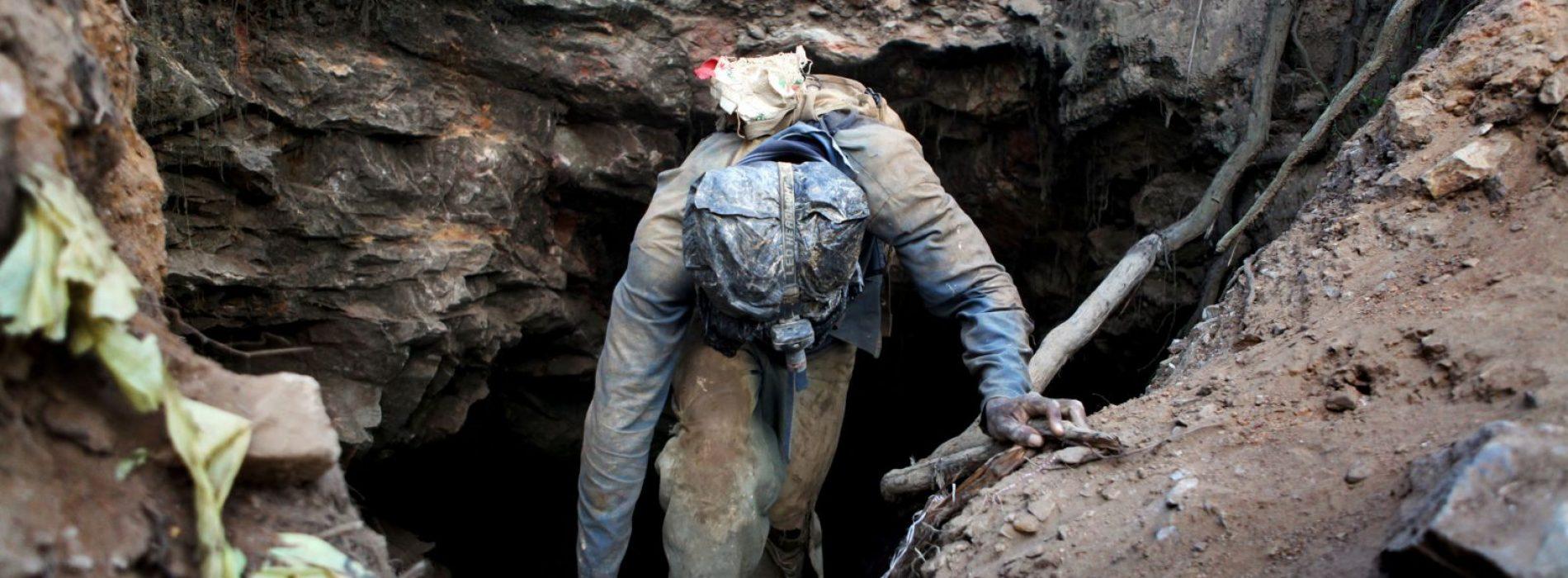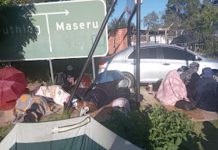Africa-Press – Lesotho. LUCRATIVE yet risky, illegal mining in South Africa has become a magnet for many Basotho, who, after failing to advance academically, often find themselves stuck in their home country where opportunities are few. To make ends meet, they are crossing the border in droves in search of survival in South Africa’s dangerous mines.
Many of the mines have been closed by their owners, leaving illegal miners from South Africa and neighbouring countries such as Zimbabwe and Lesotho to take over in unregulated activities that have brought fortune for some.
Working without any safety measures or protective clothing and equipment, others have suffered injuries or even death. Although Basotho have been crossing the border to work in South African mines for years now, the practice has become more pronounced in recent times as the local economy tumbles and opportunities become fewer.
Lesotho’s Consular General in Orkney in South Africa, Selimo Thabane, said Basotho are being pushed into the dog-eat-dog mining forays by hunger and poverty back home in Lesotho.
He said this after 11 Basotho men were found burned close to a mine in Orkney, South Africa. Five of the deceased were from Motete constituency in Butha-Buthe district. The illegal miners, who mostly cross into South Africa illegally through porous borders, stay in makeshift plastic shelters.
Their plight becomes dire during rainy seasons because their shelters cannot protect them against harsh weather conditions, while regular raids by the police keep them on their toes.
Usually clustered around their districts or villages of origin, violence often breaks out among people of different origins, usually due to competition for lucrative sites.
The fights sometimes spill into Lesotho, where victims are buried, revenge attacks follow and the cycle continues. Famo music gangs are also involved and illegal miners stay with fellow gang members.
Making inroads into another group’s territory can result in bloodshed among armed, rival gang members. In the townships where some of the illegal miners stay, Lesotho names are in rampant use. For example, there are places like Kolo, Matsieng, Ha Mokhalinyane and others named after the original homes of the illegal gold diggers.
Worried by the incessant killings in the illegal mines, the leader of the Movement for Economic Change (MEC) party, Selibe Mochoboroane, accompanied by the Principal Chief of Likhoele Lerotholi Seeiso visited the illegal mine workers recently to try and foster some peace.
The fights and killings receded for a few months after the visit but have begun gaining momentum again. Apart from violence, the mines are abuzz with business activities ranging from mining to the selling other items used by miners.
Some dig for gold ore, which is piled, carried in sacks and other containers before being sifted using dishes, basins, towels and mercury. “It is an exercise that needs patience,” a gold digger from Mafeteng, who preferred to be called Tšepang Manare, told thepost.
Manare has been an illegal gold miner in South Africa for the past seven years. The illegal miners are better known as the zama-zama, a Zulu word which means those who try their luck.
He said he learned tricks of the trade from some Zimbabweans who used to be illegal gold miners in their home country before crossing into South Arica.
Manare says they have learned this skill of sifting gold from the soil from the Zimbabweans who are also many at the closed mines. But as the fighting intensified, the Zimbabweans left, he said.
There are some zama-zamas whose job is not to mine. They specialise in supplying items such as food, cigarettes, beer and lamp or torch batteries for those who go down the mines and spend months there.
These kinds of zama-zamas strike deals with security personnel guarding the closed mines to allow them to go underground. “A lot of cash is paid to allow these people to pass through the shaft to go down underground.
Taking food underground is risky and costly,” said Manare. A loaf of bread costs M100, while a single tobacco cigarette costs M10, he said. “The food is expensive because it is risky taking it down there to the miners underground.
The good thing is that the miners have the money to pay for the provisions,” he said. Manare says once they have purified the gold, they organise to meet the buyers whom they refer to makhooa, the whitemen, a term that refers to any prosperous businessman irrespective of colour.
Once the gold is purified, it is then weighed on a scale and the transaction can proceed. Manare says the buyers pay cash, right there and then. “There is no credit facility,” he says.
At times the gold diggers would have caught a “big fish” and the buyer would plead for more time to raise the cash. “These people have a lot of money,” Manare says.
Manare says when the illegal miners find a place that is rich with gold deposits, they invite their homeboys so that they could share the cake. And when they strike it rich, the zama-zamas would come home to Lesotho where they flaunt their recently acquired riches.
They would buy fancy clothes with some even buying cars. Others would build beautiful homes in the villages. They would also drink like fish at the village bars.
Even when they are home, they walk in groups, a sign that they are constantly on the watch-out for their own safety. Litompo Molisenyane, a former miner, says most zama-zamas have struck deals with mine workers, particularly security officers.
They know how the shifts work and therefore only go down when it is safe to do so. Molisenyane says some zama-zamas even spend as much as a year underground digging gold illegally.
Should those who bring the items get arrested, the security officers lose their jobs instantly and forfeit their benefits. He said the gold underground is highly concentrated.
When they are done with their mining activities, the zama-zamas pay their way out. “They even have phones and are able to communicate with their family members while still underground,” Molisenyane says.
For More News And Analysis About Lesotho Follow Africa-Press






